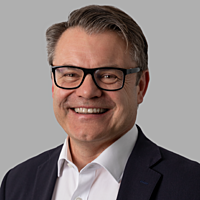No secret sauce! The simple process with a proven track record
At Claremont Global, we believe that good investment ideas and good companies are rare. But good companies at the right price, run by the right people, are even rarer.
As such, we endeavour to put together a portfolio of very high-quality businesses with decent organic growth, faster than nominal GDP growth, high margins, high returns on capital and very little debt.
There is nothing secret in the sauce - I'm sure you have heard all of the above before. Executed with the proper discipline, however, the strategy becomes quite powerful. Not only because it allows us to find the companies that meet our criteria, but because it allows us to eliminate those that we don't understand and do not have an edge in.
We stay away from anything that's regulated, commoditised, leveraged or complicated. We also strictly adhere to our valuation principles, and we do not adjust our discount rates. Put simply, we stay within our circle of competence.
All of this means that we are hyper-selective when it comes to the names that make it into the portfolio. Just 10-15 of the highest-quality businesses in the world.
In the following video, I discuss in further detail the Claremont process and how it has enabled us to generate returns ahead of benchmark since inception, and I also discuss a handful of companies that we believe have the right characteristics right now.
Edited Transcript Below
Hi, I'm Bob Desmond. I'm head of Claremont Global and co-portfolio manager for the Claremont Global Fund.

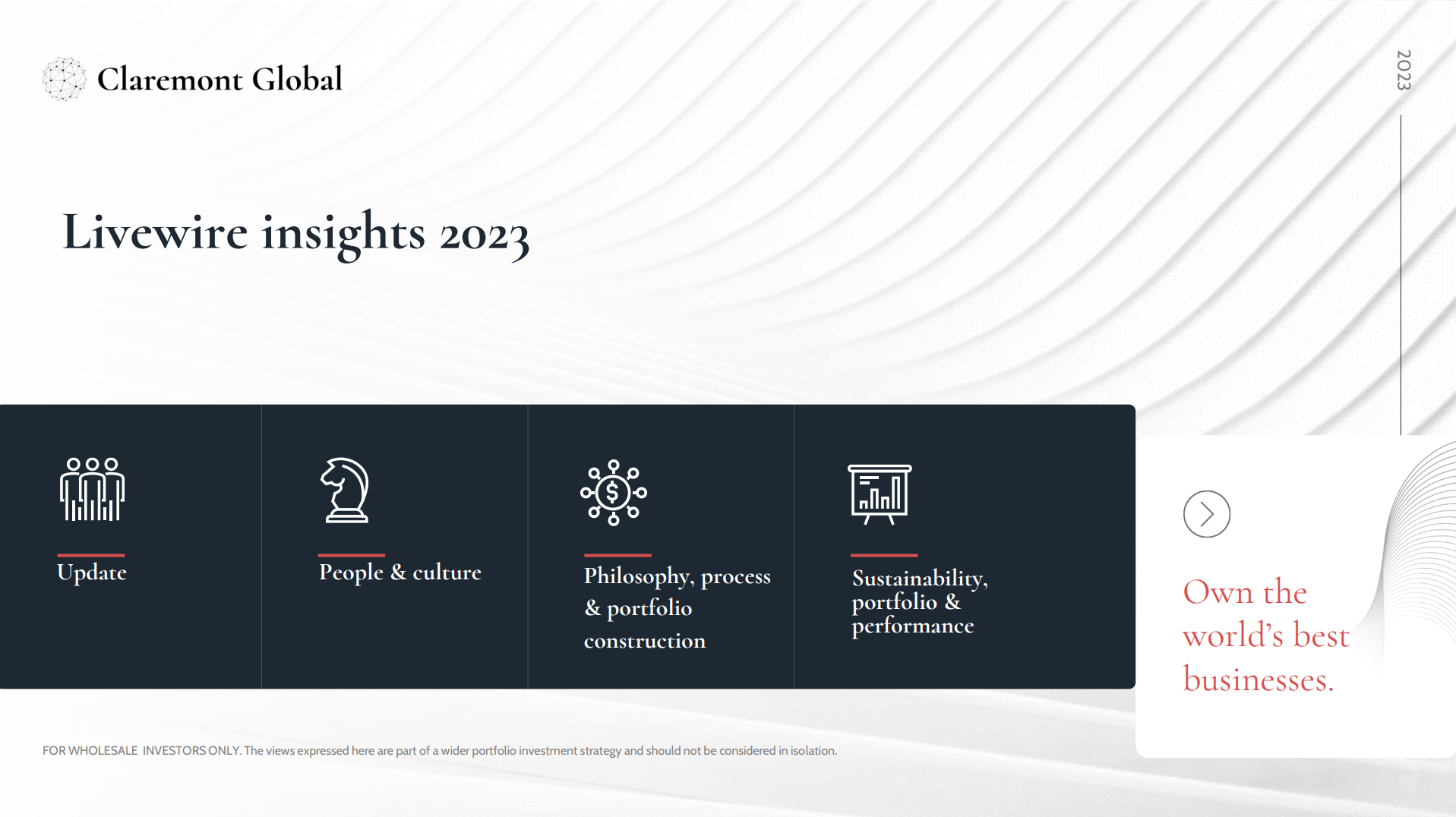
Today, I'm going to talk to you about our fund and why we think it's slightly different, in the global context, in the Australian funds management landscape. I'll talk to you about our process, how we put the portfolio together, our target returns and what we hope to achieve for your clients over the long term.
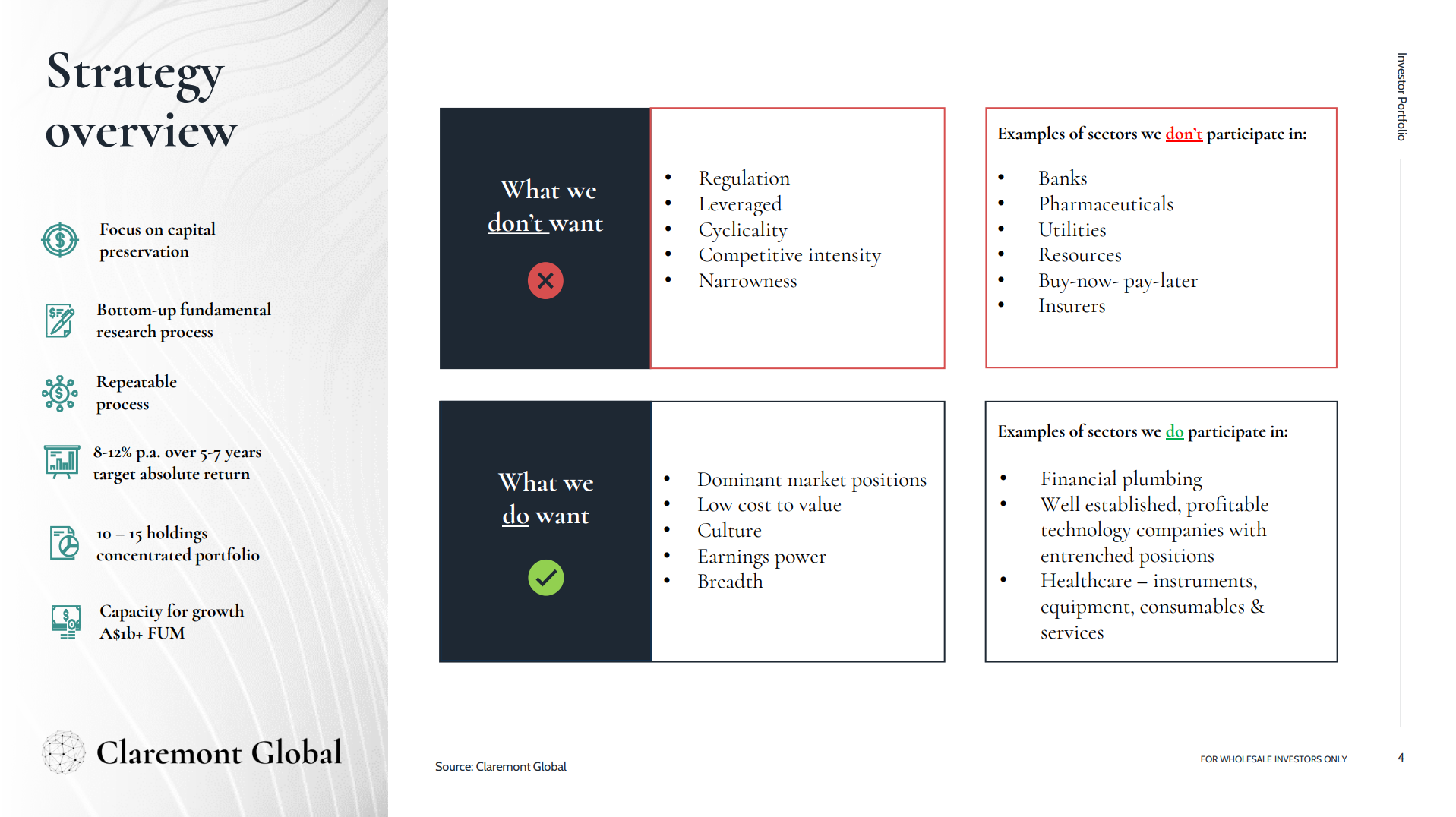
Looking at the fund and starting with the strategy - the fund in its entirety - there's a couple of things I'll take away where I think we are slightly different.
It's a very focused portfolio. It only has 10 to 15 of the highest-quality global stocks in its portfolio.
You'll find many funds will have 50 names, sometimes 100, and we like to keep our capital concentrated in our best ideas.
We think good investment ideas are rare and we want to put that capital into those ideas. Good companies are rare. Good companies at the right price run by the right people, even rarer.
The fund has been going for over 11 years now. I joined the strategy in 2012 and have been managing it as co-portfolio manager with Adam Chandler since 2017.
We aim to get a return of 8 to 12% over a five to seven-year period, and I do stress that's over five to seven years. We are not short-term. We look to perform over a full earnings and economic cycle.
A couple of other things I would talk about is we put the portfolio together with no macro inputs whatsoever.
When we all meet around the water cooler, we all have our views, we all have our views on interest rates, but if you sit in one of our investment meetings, you will see we put the portfolio together with no thinking around the macro. We don't try and target thematics.
What we're trying to do is to put together a portfolio of very high-quality businesses and by high quality, we mean decent organic growth, faster than nominal GDP growth, high margins - currently in excess of over 30% across the portfolio, high returns on capital - which are mid-teens as we currently stand, and very little debt. We are almost net cash across the portfolio.
Some of the highest quality businesses in the world that have a high level of earnings certainty, a high level of competitive advantage, and then we try and buy those businesses at what we consider a fair price.
I'm sure it's stuff you've probably all heard before. There's nothing secret in the sauce, no magic there.
What we try and do to be as disciplined as possible, we try and stay away from things we don't understand. Basically, what we stay away from is complexity, commoditized, leveraged, and regulated. We just go nowhere near that.
The fund currently and the strategies it stands is $1.2 billion. That's a nice size. It makes us very solidly profitable, but it's not such a big amount of FUM that we struggle to only focus on large caps. We can drop down into mid-caps. In fact, by mandate we can drop down to $3 billion. It is very much around a repeatable process.
We are not, as I said, trying to pick macro. We are not trying to pick thematic.
It is all around picking stocks - picking stocks with a sustainable competitive advantage and a high level of earning certainty. We don't swing for the fences.
What are the things you won't see in the portfolio?
Looking at some of the things you won't see in the fund, you won't see regulated businesses, we won't see utilities in there. You won't see leverage businesses. We don't like banks, insurers, utilities. You won't see cyclical businesses. We are not very good at picking the cycle, so you won't see commodities, you won't see banks. We hate competitive intensity.
Very often, growth actually attracts competition and one of the instances we like to point to is buy now, pay later. Very exciting if you cast your mind back to a couple of years ago. A very exciting space, but that attracted a lot of competition. New entrants seemed to be entering that sector almost on a monthly basis.
If you look at our portfolio, the average holding we have is over 80 years old. Very stable oligopolies and with such a concentrated portfolio, we look for global businesses. We hate businesses that are concentrated by customer or by geography or by product. We like a lot of diversification across the businesses that we own.
What are the things you will see in the portfolio?
We love dominant market positions. That gives companies the scale, the scale in R&D, in marketing, in reach. We're definitely number one or number two in all the businesses that we own in the fund.
If you take one thing away from today, we love low cost to value, and what we mean by that is that the product that you buy from our businesses is very low cost, but massive value.
Something we think about is something like a Microsoft Office 365 licence that would cost you around $30 a month. If you think of the utility of that, the utility of running that business, you cannot get that out of running a business.
They could charge way more than that and you wouldn't be able to negotiate with them on price.
We love companies that have great corporate culture. It's often hard to measure, but one of the things we look for are companies that are obsessed by their customers, by their employees, by their suppliers, and look after their shareholders. One of the things I hate when I visit a company or read about it is the first thing when they say, "We look to create shareholder value." That's such a blah statement for us.
What we are looking for are companies who can demonstrably point to high NPS scores, low levels of employee turnover, high levels of employee engagement, good proxy statements, broad proxy statements, not focusing on one adjusted economic measure.
As I said, we love businesses that are broad. What type of industries would you see in the portfolio? Well, we love financial plumbing, things like Visa (NYSE: V), things like CME (NYSE: CME), the world's largest interest rate Futures Exchange, Equifax (NYSE: EFX), one of the world's largest credit bureaus. If you think you are borrowing a million dollars to buy a house, the bank's lending you a million dollars, to buy that credit report is going to cost a couple of dollars. That's extraordinary value in the context of lending that report and well in the bank's interest.
We love established technology businesses. As I said, we don't make big predictions, but businesses that are established, we own things like Microsoft (NYSE: MSFT), Adobe (NYSE: ADBE), and Alphabet (NYSE: GOOG), the parent company of Google.
High margins, strong balance sheets, entrenched competitive advantage and earning certainty. We don't make big bets on companies that have huge TAMs (total addressable markets) in theory, but no profits and weak cash flow and balance sheets.
We stay away from regulated parts of healthcare, regulated or complicated. Things like pharmaceuticals where we have no edge in predicting phase three drug trials, or the outcome of US selection, or drug pricing. We much prefer to be in niche areas.
We have a sterilisation business, we have an instruments business that sells into 250,000 labs around the world and we also have a very good animal healthcare business. You won't find us, as I said, in lots of areas. You won't find banks, you won't find commodities, and if that's what you're looking for, this is probably not the fund for you.
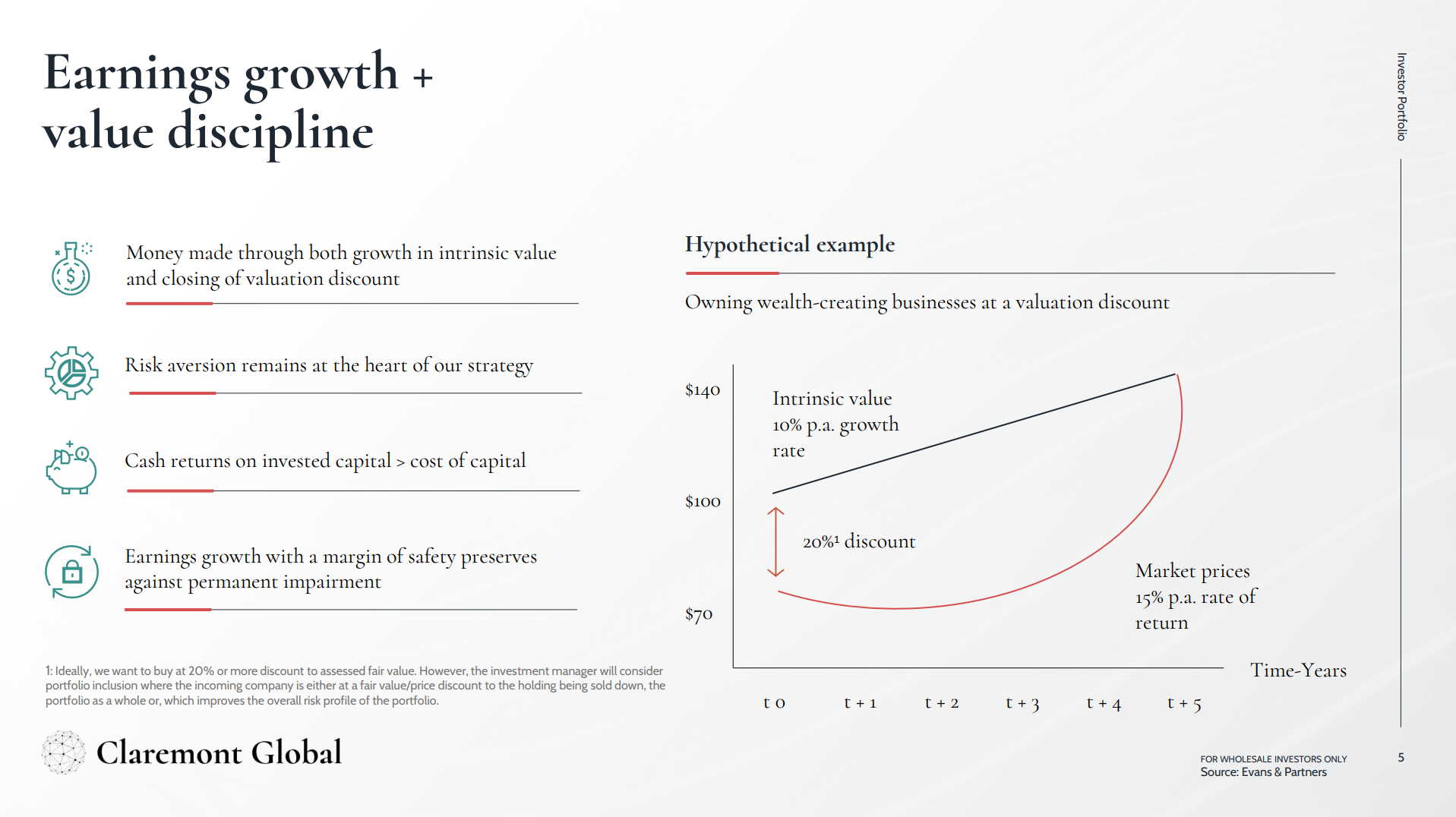
Value or growth?
We often get asked are we value or are we growth?
We say we're both. it sounds cliched, but we are looking to buy growing businesses, and if you actually look at that graph there, if we can buy a business that's growing a 10% per annum and we can buy the 20% discount to value and that value closes, over four years, we'd be looking at a 15% per annum return.
Those are the type of businesses we like to earn. We are not looking to pay big multiples, but by the same token, we are not looking to buy cheap and nasty, and actually, I think that served us well over the last year.
As high multiple stocks have been punished, as rates have gone up, we've done relatively well. I think last year, we were about 1% behind our benchmark, but that was without any oils or those sectors that did really, really well. We pay a lot of attention to valuation.
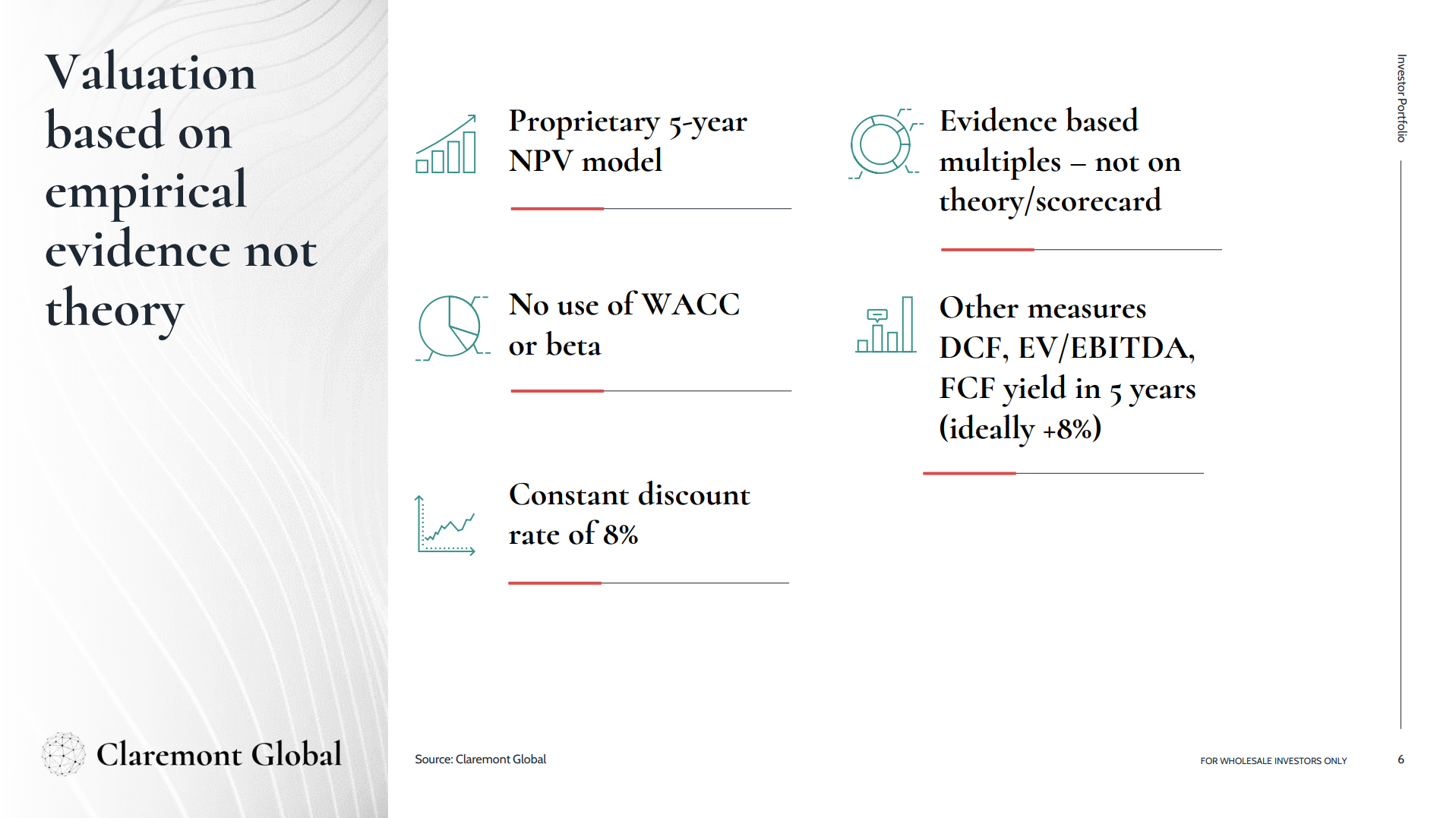
Valuations
The next slide I'm going to talk to you about is how we look at valuations.
We do not adjust our discount rates. It's always 8% and I think that served us well over the last couple of years. Many, many companies, and people who allocate capital, reduced their discount rates to some of the lowest rates we've seen in hundreds of years that pumped up valuations, only to take them down again a year or two later, seeing a corresponding fall in their valuations.
We look at what we think a business will earn in five years time and then we look at what that value is in five years time and we discount that back to today and as a result, we are not big fans of the 10-year discounted cash flow (DCF).
Five years itself is a long time, but I've seen DCFs do all sorts of wonderful things. You can adjust your discount rate, you can adjust your terminal growth rate, you can adjust your weighted average cost of capital. We try and keep things simple and we make them easily measurable and try and keep the complexity out of our valuation work.
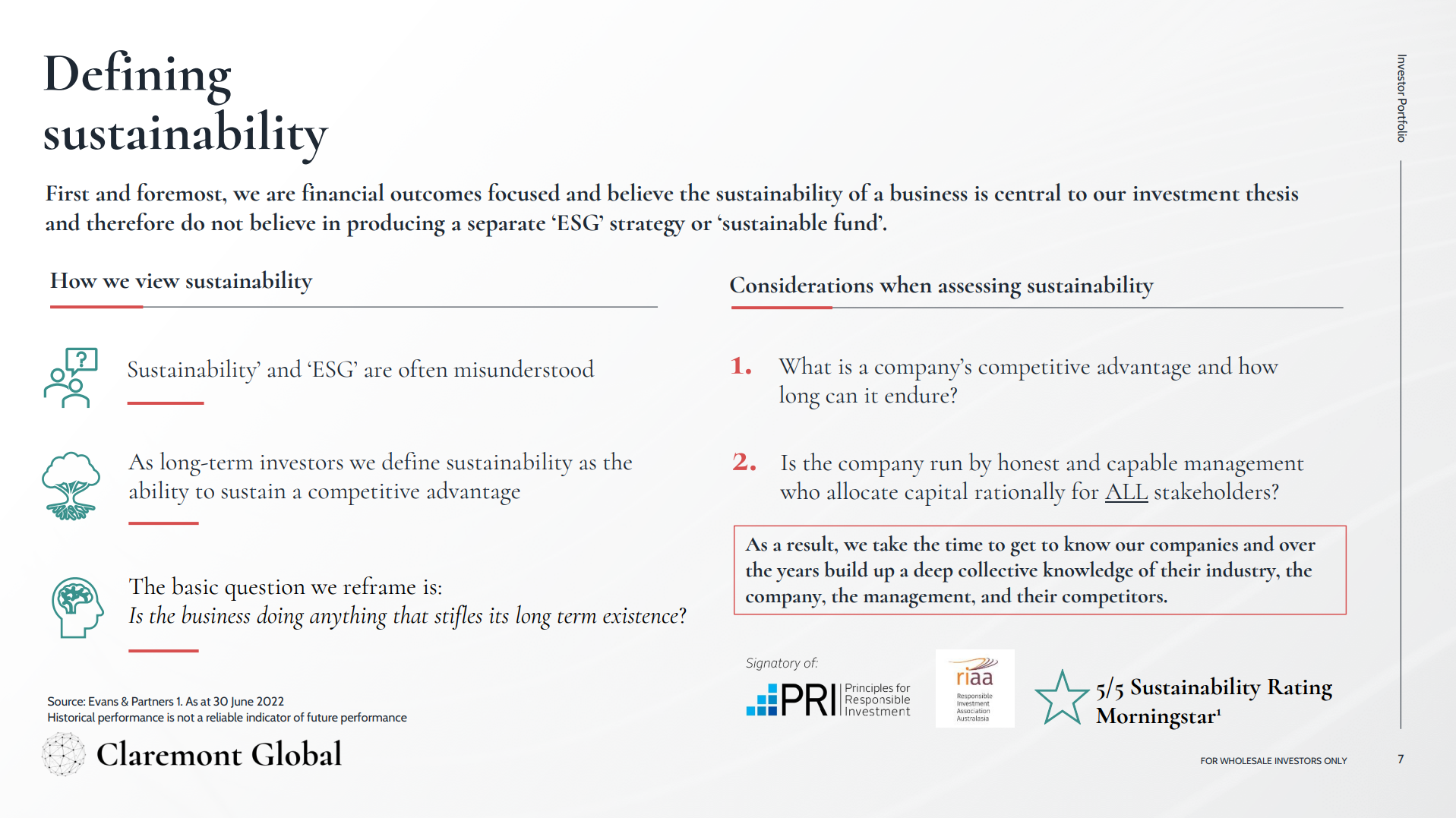
We are often asked about ESG, how we think about ESG. I think in recent years, there's probably been some form of asset gathering there. A lot of funds have pretended to be ESG and, in essence, we don't think that is actually what was going on.
We don't pretend to be an ESG fund or a green fund or greenwashing. For us, the key thing is ESG really boils down to one key thing and that is actually culture and values. Again, what I said, we look for customers that relentlessly focus on consumers, who treat their employees well, who treat their shareholders well and look after their communities. It's an end result of our process. We never start there. Having said that, if you actually look at a Morningstar rating, we get five out of five star ratings on our process and we stay away from a lot of industries that we think have, let's say, ethical concerns.
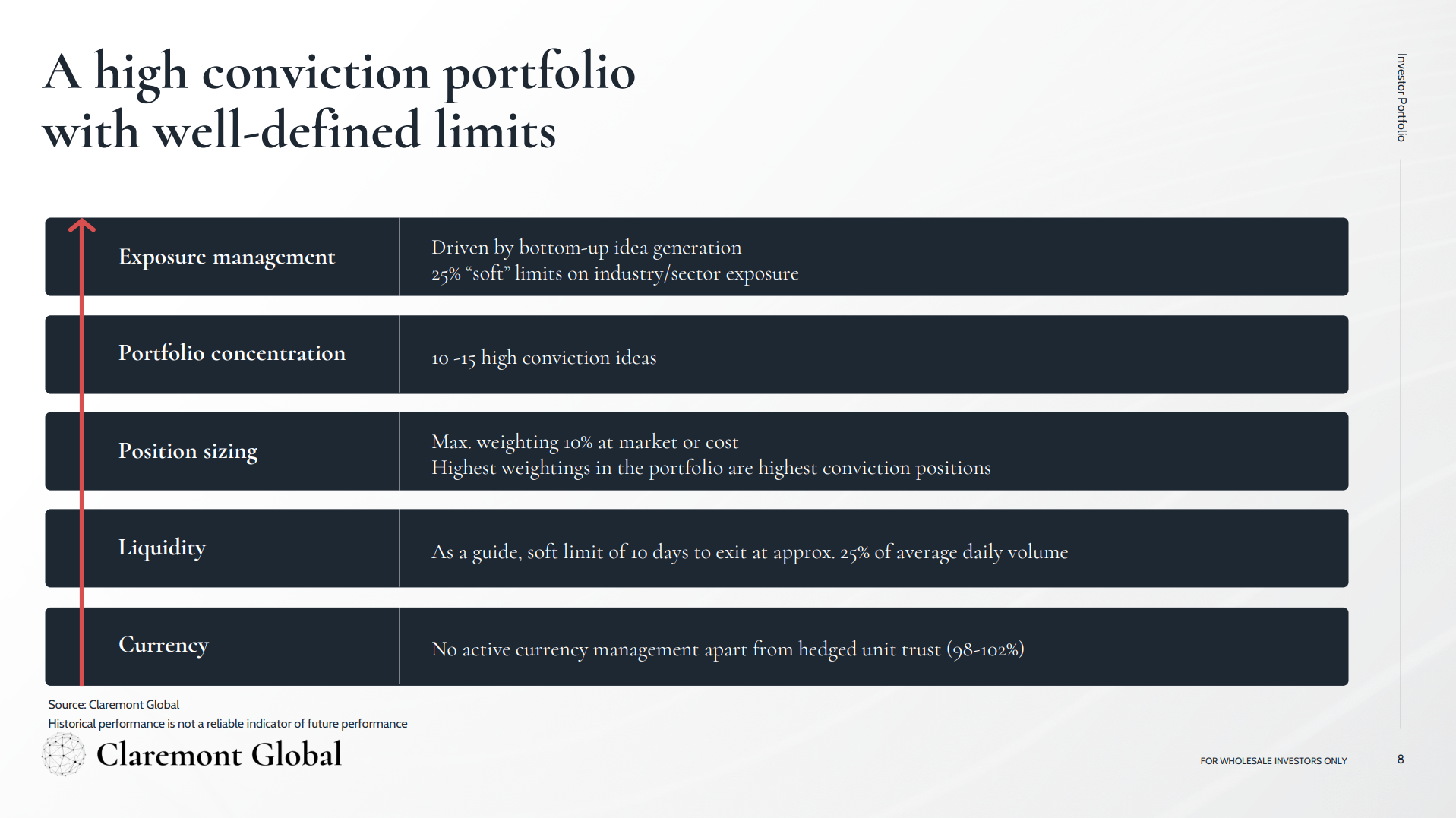
Key rules
A couple of key rules when we put together the portfolio, exposure management. We have soft industry limits of 25%. Portfolio concentration, 10% max in any one position and a 10% max cash position.
When we look at liquidity, we know that we will make mistakes. We also know that our clients want their capital back, so we have a rule that when we enter a position, we want to be able to exit in two weeks or 10 trading days at no more than 25% of the volume and we don't pick currencies. It's a tough game to do.
We have a fully hedged unit trust and one that is totally unhedged and we leave you, the client or the advisor, to make your own decision on the currency.
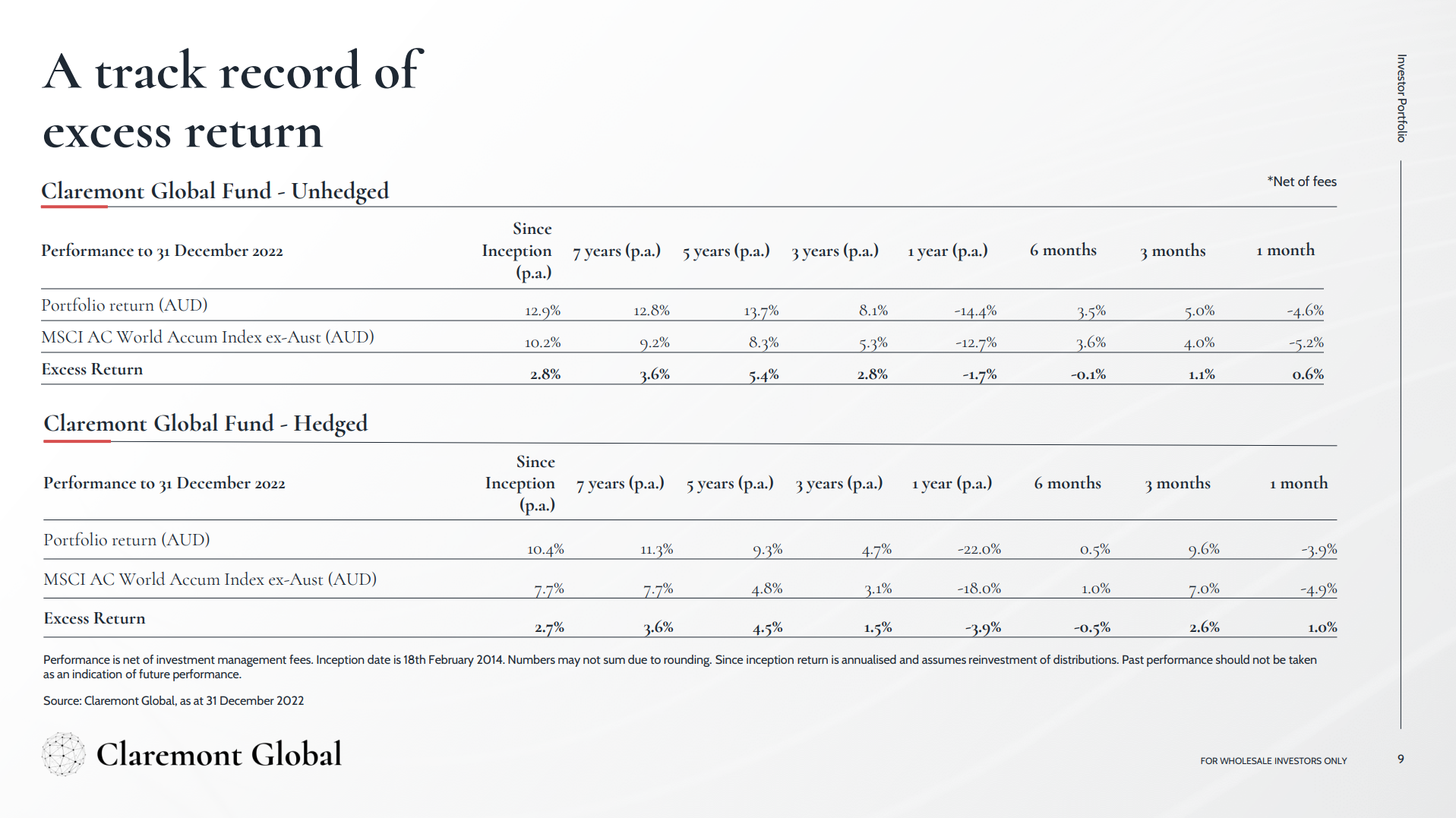
Track record
Finally, I'll just sum up with our track record. As I said at the beginning, we target 8 to 12% per annum over the cycle. I'm glad to say since inception, we've done that. The unit trusts were put in inception nearly nine years ago, and since inception, the unhedged unit trust has done 12.9% per annum, 2.8% ahead of its benchmark, and the hedged unit trust has done 10.4% per annum, 2.7% ahead of its benchmark.
Over five years since Adam Chandler and I have been running the fund, we've delivered a 5.4% in the unhedged portfolio and 4.5% alpha in the hedged portfolio.
The Claremont difference
To sum up, why do I think we are different?
I think we are very focused, only 10 to 15 names. We relentlessly focus on quality. We have some of the highest quality businesses in the portfolio. The reason we do that, in good times, the earnings growth will drive forward the value. In bad times when things are tough, it's good to know your own quality. It allows our clients to sleep well at night and it allows people to stop them getting scared out of good businesses.
We've focused a lot on valuation. We don't put any valuation on our businesses. We don't drop discount rates when interest rates are low and we stay away from things we don't understand or are complicated, things like I spoke about banks, oils, commodities. Anything that's regulated, commoditized, leveraged or complicated, we don't go near. We stay within our circle of competence.
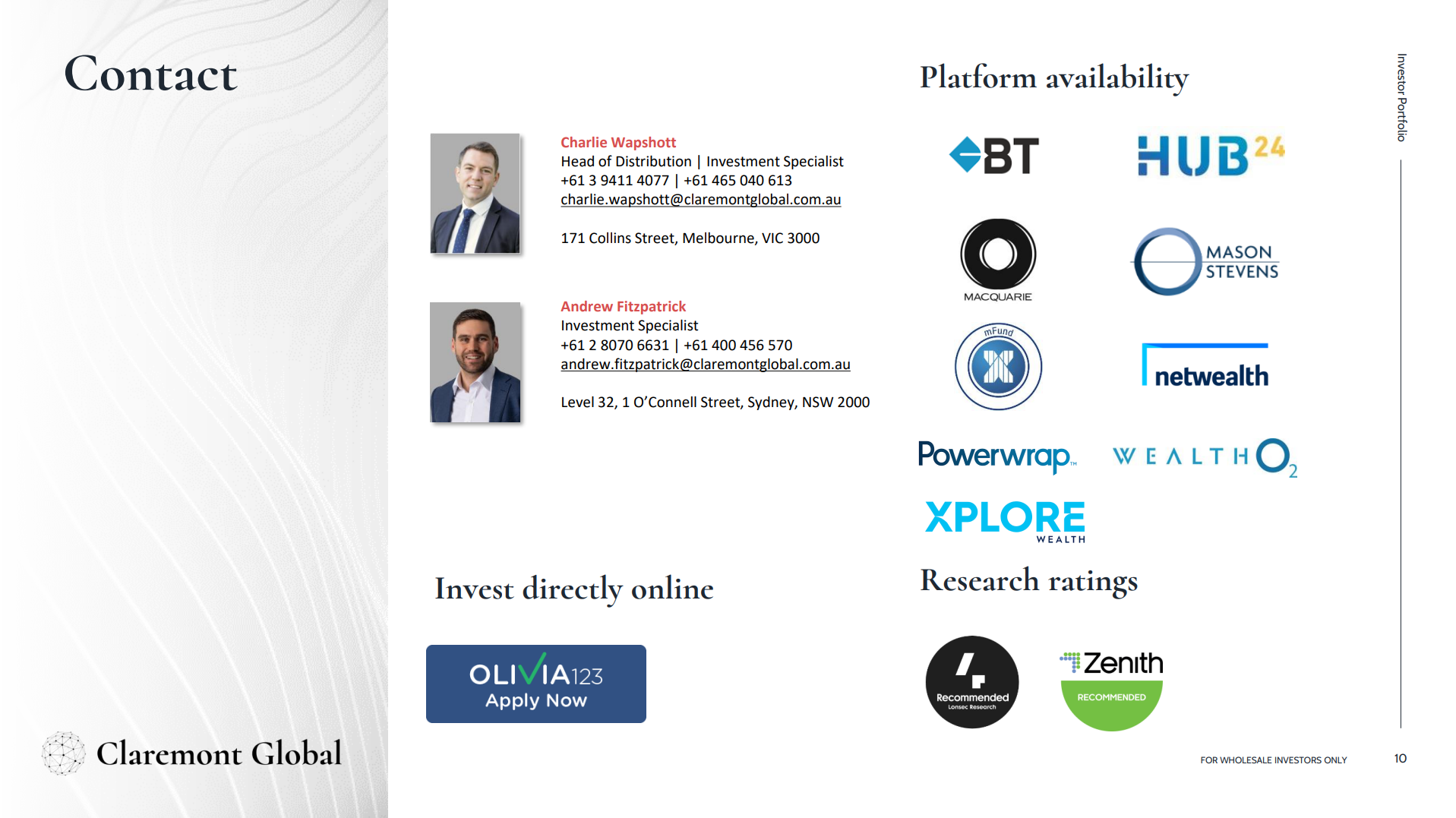
If that's something you're interested in, please go look at our website, claremontglobal.com.au. There's two of our distribution people there on the slide. The fund is rated, recommended by both Zenith and Lonsec. You can also apply online and it's pretty much available across all Australian platforms. Thank you for listening to me and we look forward to hearing from you.
Own the world's best businesses
Claremont Global is a high conviction portfolio of value-creating businesses at reasonable prices. For further information on the fund, please visit our website or fund profile below.

3 topics
6 stocks mentioned
1 fund mentioned
1 contributor mentioned

